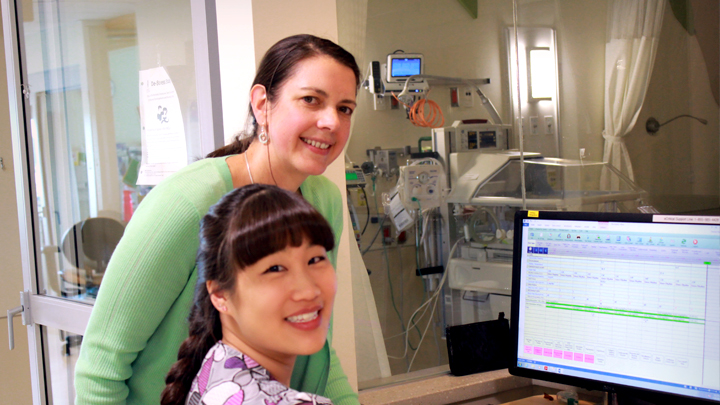
June 21, 2017

Registered Nurse Jessica Cheung and Patient Care Manager Emma Folz, patient care manager, show off the new eCritical system recently installed in the Neonatal Intensive Care Unit at the Alberta Children’s Hospital in Calgary.
Story by Sharman Hnatiuk
CALGARY — Change is rarely easy, but Emma Folz, patient care manager of the Neonatal Intensive Care Unit (NICU) at the Alberta Children’s Hospital (ACH), could see past the challenges and towards the benefits of the unit’s transition from paper to eCritical electronic records.
Since 2012, eCritical Alberta has been setting up a critical care clinical information system in all adult, pediatric and cardiac intensive care units across the province.
eCritical comprises a bedside system (MetaVision) — which supports standardized clinical documentation, electronic data capture from medical devices and clinical decision support — and a data warehouse (TRACER), which supports clinical analytics and reporting functions.
Last December, the ACH NICU became the first NICU in Alberta to implement eCritical and offer neonatal clinicians real-time information to ease patient care
“The conversion of the entire unit from paper to electronic records happened in one day,” says Folz. “It was a difficult transition for our staff and physicians, but now that we’re integrated and have a few months with the program, you can really see the benefit of having immediate access to a patient’s information or statistics about the entire unit.”
In addition to an electronic patient record, eCritical provides open access to reports related to patient acuity, utilization, quality and outcomes of care. As well, its data-extraction and analytics services enable timely and efficient clinical operations and planning, quality improvement projects and research activities.
By housing all information electronically, the program supports and enhances quality initiatives by allowing staff to access everything from occupancy rates to the number of extubations.
“Easy access to a unit’s worth of data will have a huge impact on our ability to conduct research on the unit, but it also helps with other quality measures, like what time of day we transfer patients, and how can we make that transition smoother for families,” adds Folz.
The Misericordia Community Hospital NICU in Edmonton went live with eCritical in March; the goal is to have eCritical active in all 13 NICUs across Alberta within two years.
Throughout the transition, the eCritical team works with each unit to ensure all systems are working optimally, providing staff training and two weeks of intensive support after going live, followed with 24/7 remote support afterwards.
The eCritical Alberta program is led by an innovative collaboration of clinical and information technology leaders with support from provincial advisory groups that span neonatal, pediatric, adult and cardiac critical care.